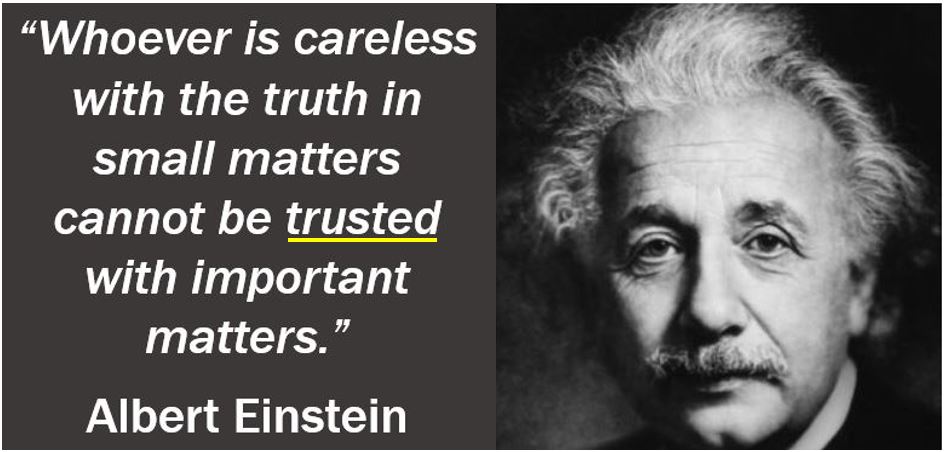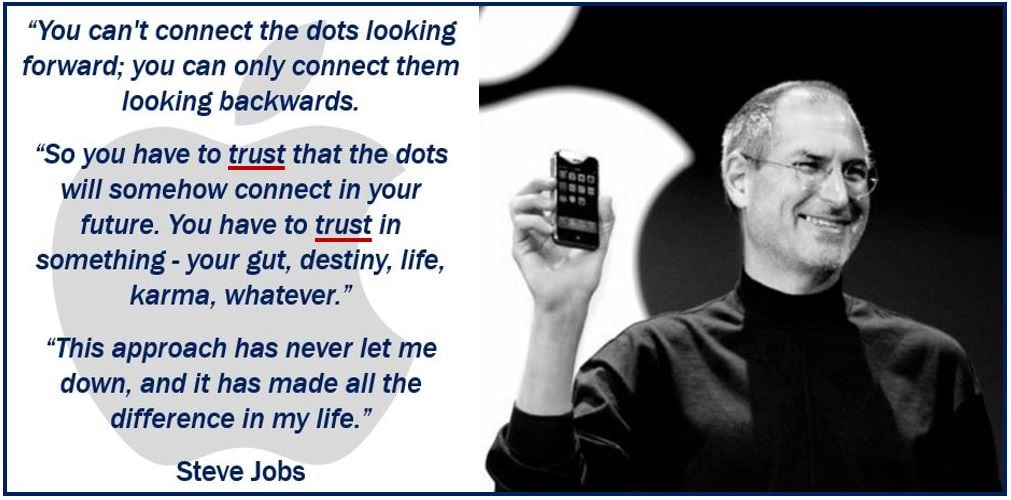Trust – definition and meaning
Trust is probably the most important economic asset in the world of business and finance, without it we would be living in a completely different, considerably poorer, and more backward place.
Trust is total faith – a firm belief – in the truth, reliability, or ability of someone or something. Trust takes time and effort to create, but can easily be destroyed. It is a vital ingredient in an economy’s **social capital.
** Social capital refers to the value of human networks – the collective value of all human networks and the tendency that emerges from these networks for individuals to trust one another and do things together.
If we trust one another, we are more likely to do business together, such as lend each other money, invest in other people’s businesses and ventures, create partnerships, work for another person knowing that at the end of the month they will pay us.
The following quote comes from The Economist’s glossary of terms:
“Trust can reduce market failure that otherwise results from asymmetric information. When there is a lack of trust, people may have to spend heavily on monitoring others’ behavior to ensure they do what they say they will do. This cost may be so high that it is not worth going ahead with a business deal.”
Trust is a concept we become familiar with very early in our lives. It is a vital ingredient for a happy and successful life – both in our personal, professional and business affairs.
“Trust is both an emotional and logical act. Emotionally, it is where you expose your vulnerabilities to people, but believing they will not take advantage of your openness.”
“Logically, it is where you have assessed the probabilities of gain and loss, calculating expected utility based on hard performance data, and concluded that the person in question will behave in a predictable manner.”
“In practice, trust is a bit of both. I trust you because I have experienced your trustworthiness and because I have faith in human nature.”
With trust there is flexibility
People are less flexible in their dealings with each other when there is no trust. Nations and governments can overcome some of the problems associated with distrust by introducing laws requiring people to behave properly, honestly, and with consideration.
However, the laws and regulations are only effective if people believe that they will be enforced.
Businesses invest heavily in a brand in their attempt to demonstrate that they are trustworthy.
 Albert Einstein (1879-1955) was a German-born theoretical physicists. Apart from developing the ‘Theory of Relativity’, one of the two pillars of modern physics, together with quantum mechanics, his work also had a strong influence on the philosophy of science. In 1921, he received the Nobel Prize for Physics “for his services to theoretical physics, and especially for his discovery of the law of the photoelectric effect.” (Image: adapted from biography.com/people/albert-einstein)
Albert Einstein (1879-1955) was a German-born theoretical physicists. Apart from developing the ‘Theory of Relativity’, one of the two pillars of modern physics, together with quantum mechanics, his work also had a strong influence on the philosophy of science. In 1921, he received the Nobel Prize for Physics “for his services to theoretical physics, and especially for his discovery of the law of the photoelectric effect.” (Image: adapted from biography.com/people/albert-einstein)
What is a trust fund?
A trust is an arrangement in which a party (the trustor, grantor, or donor) gives control of his or her property to another party (trustee) for the benefit of a third party (the beneficiary).
So, to recap: the trustor creates the trust , the trustee is responsible for administering it, and the beneficiary receives the benefits from it.
The assets that are held in a trust are said to be in a trust fund. There are many different types, depending on why it was created, and whether the trustee has full powers or has to consult with the beneficiary or trustor.
The four main types of trust are:
– Testamentary: this is established through a will. It comes into effect upon the death of the trustor.
– Living: it comes into effect while the trustor is still alive.
– Revocable: after it has been created, it can be terminated or modified by the trustor.
– Irrevocable: be careful when you create this one, because when it comes into effect there is no going back – the trustor cannot modify or terminate it.
Trusts are often created because the individual wants privacy. People who do not want their wills publicly posted may opt for trusts instead.
In most cases, the assets of the person who died are passed to the spouse/partner and then equally divided to the offspring (children). If the children are not legally adults – if they are under 18 – trustees are necessary. The trustees are only in control of the assets until the children reach eighteen years of age.
 Steve Jobs (1955-2011) was an American entrepreneur, inventor, businessman, and industrial engineer. He was the co-founder of Apple Inc., and was also CEO of the company. His creativity, business acumen, and vision helped change how we use computers, listen to music, and use communication devices. (Image: appleinsider.com)
Steve Jobs (1955-2011) was an American entrepreneur, inventor, businessman, and industrial engineer. He was the co-founder of Apple Inc., and was also CEO of the company. His creativity, business acumen, and vision helped change how we use computers, listen to music, and use communication devices. (Image: appleinsider.com)
In some countries, trusts are an effective way of avoiding tax (tax avoidance is legal, unlike tax evasion, which is illegal).
The United States’ Internal Revenue Service has the following definition:
“In general, a trust is a relationship in which one person holds title to property, subject to an obligation to keep or use the property for the benefit of another.”
“A trust is formed under state law. You may wish to consult the law of the state in which the organization is organized. Note that for a trust to qualify under section 501(c)(3) of the Code, its organizing document must contain certain language. Publication 557 contains suggested language.”
According to the British Government:
“A trust is a way of managing assets (money, investments, land or buildings) for people. There are different types of trusts and they are taxed differently.”
Why set up a trust?
Trusts are set up for a variety of reasons:
- – To protect and control the assets of one’s family.
- – When the beneficiary is too young to handle his or her affairs.
- – When the beneficiary cannot handle his or her affairs because he/she is incapacitated.
- – The trustor may wish to pass on assets while he or she is still alive.
- – Creditor protection.
- – Protection against relationship property claims.
- – Protecting against beneficiaries who are not good with money (spendthrifts).
- – Flexibility to react if or when there is a change in the law.
- – To benefit charities or institutions.
In order to set up a trust agreement, you will need to use the services of a specialized lawyer – they are complicated contracts.
An offshore trust is one that the trustor creates abroad. It is usually outside the jurisdiction of the trustor’s country of residence.
Video – Building trust
In this Tedx Talks video, James Davis, Professor of Strategic Management, and Chairman of the Management Department at Utah State University, talks about what the most important ingredient is for a successful business. He believes it is relationships, which are fundamentally based on trust.

